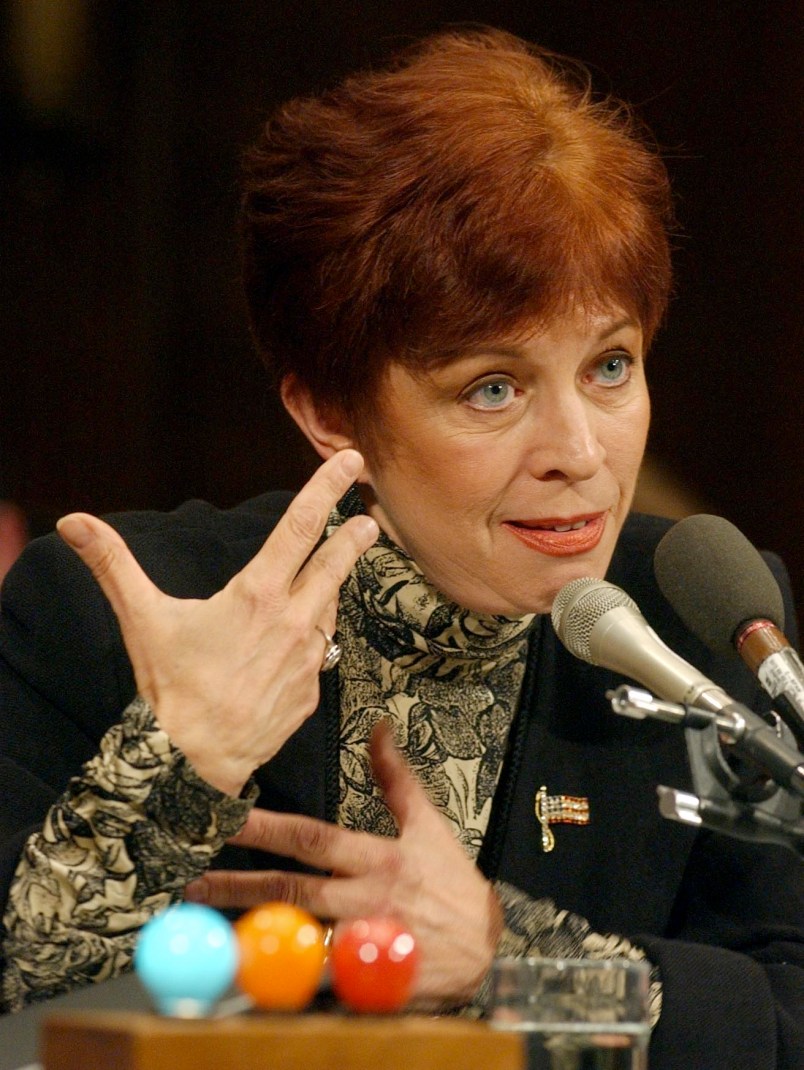Add big-name Republican lawyers Joseph diGenova and Victoria Toensing to the list of Mujahedin-e Khalq (MEK) supporters in Washington D.C.
On behalf of the Iranian-American Community of North Texas, diGenova and Toensing’s firm has registered to lobby for the removal of the MEK, an Iranian opposition group, from the State Department’s Foreign Terrorist Organization (FTO) list, and for the protection of the 3,400 MEK members who currently live at Camp Ashraf, in Iraq, where they have been subject to attacks and other privations.
“The government can produce no evidence to one act of violence post 2003,” Toensing said in an interview with TPM. “The delisting considerations are supposed to be every five years. There is no factual basis to maintain them on the FTO.”
Toensing added that “whatever happened prior to 2003” is in dispute, but “even if you accept them” the list’s own rules support the delisting argument.
“Under the statutory construct, that means they should be taken off the list,” she said.
A prominent DC power couple, Toensing and her husband, diGenova, were among Bill Clinton’s biggest tormentors during the 1990s, and helped drive the Monica Lewinsky scandal. Readers may recall their near omnipresence on cable news at the time.
The MEK is accused of killing a number of Iranian officials over the years, and the State Department’s website states that during the 1970s, “the MEK staged terrorist attacks inside Iran and killed several U.S. military personnel and civilians working on defense projects in Tehran.” (The group and its supporters now blame the killing of U.S. citizens on a splinter group that usurped the MEK name.) In 1986, the MEK fled to Iraq, where they were armed and funded by Saddam Hussein, before being deployed in the Iran-Iraq war. The State Department also states that in 1991, “the group reportedly assisted the Iraqi Republican Guard’s bloody crackdown on Iraqi Shia and Kurds,” a charge the group now vigorously denies. Since the Islamic Revolution, thousands of MEK members have been arrested and executed in Iran.
Despite being placed on the FTO list in 1997, the MEK has a history of support in Congress. And a recent series of events sponsored by a group named Executive Action LLC has featured some of group’s highest-profile backers yet. Among the speakers at recent events have been former CIA directors, chairmen of the Joint Chiefs of Staff, senators, governors and other high-ranking officials.
“These are people who care about government,” Toensing said. She singled out two recent MEK backers in particular: former New Mexico Gov. Bill Richardson and former UN Ambassador John Bolton.
“It has to be convincing to people that the two of them come down on the same side of the issue,” Toensing said. Toensing also said that Bolton and former CIA director James Woolsey, who spoke at a pro-MEK event in January, were among those she consulted when she was researching the group.
At the recent events, speakers have argued that the MEK is critical to any chance of regime change in Iran. They’ve sought to portray U.S. support for the MEK as a diplomatic move that falls somewhere between ineffective sanctions and military intervention. TPM asked Toensing if delisting the MEK should be part of a conversation about engagement with Iran.
“I think the subject of delisting should be on its own merits,” she said, before adding, “it seems to me they are connected. This administration, like the Bush administration, is saying ‘I don’t want to do this because I don’t want to upset the Iranians.'”
The MEK says that it has renounced violence, and now advocates a secular and democratic Iran. But it is unclear how much support the MEK maintains in Iran itself. The State Department and others have described the group as cult-like. In February, Iranian studies scholar Ahmad Sadri told TPM that U.S. support for the MEK would anger ordinary Iranians, who have not forgotten that the group fought alongside Hussein. The State Department also reports that since the fall of Hussein, the MEK has increasingly had “to rely on front organizations to solicit contributions from expatriate Iranian communities.”
Last week, Secretary of State Hillary Clinton appeared before the House Foreign Affairs Committee, and several lawmakers urged her to delist the MEK. Clinton said that the State Department is currently reviewing the MEK’s designation, in accordance with a Washington D.C. District Court of Appeal’s recent ruling.






